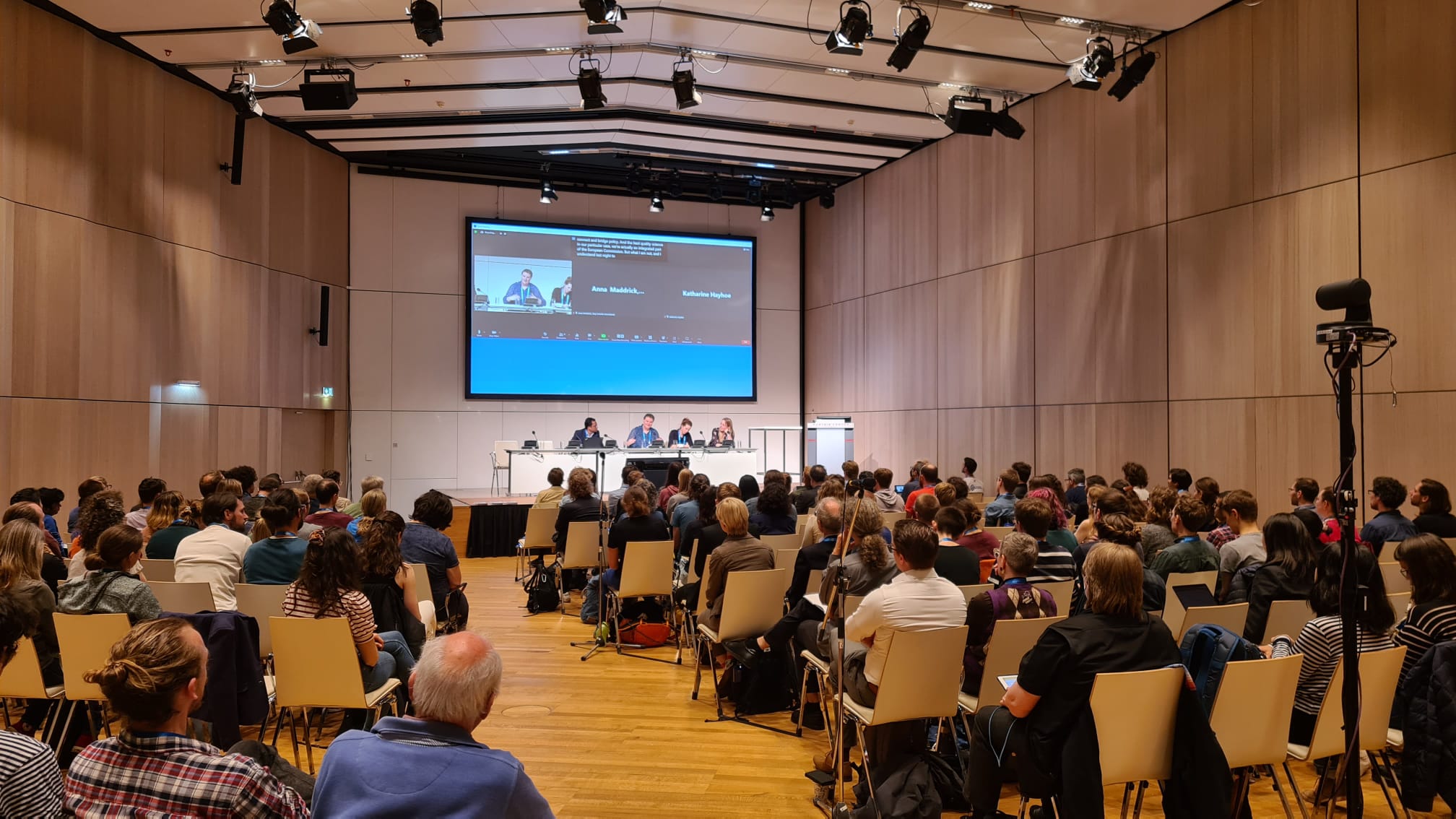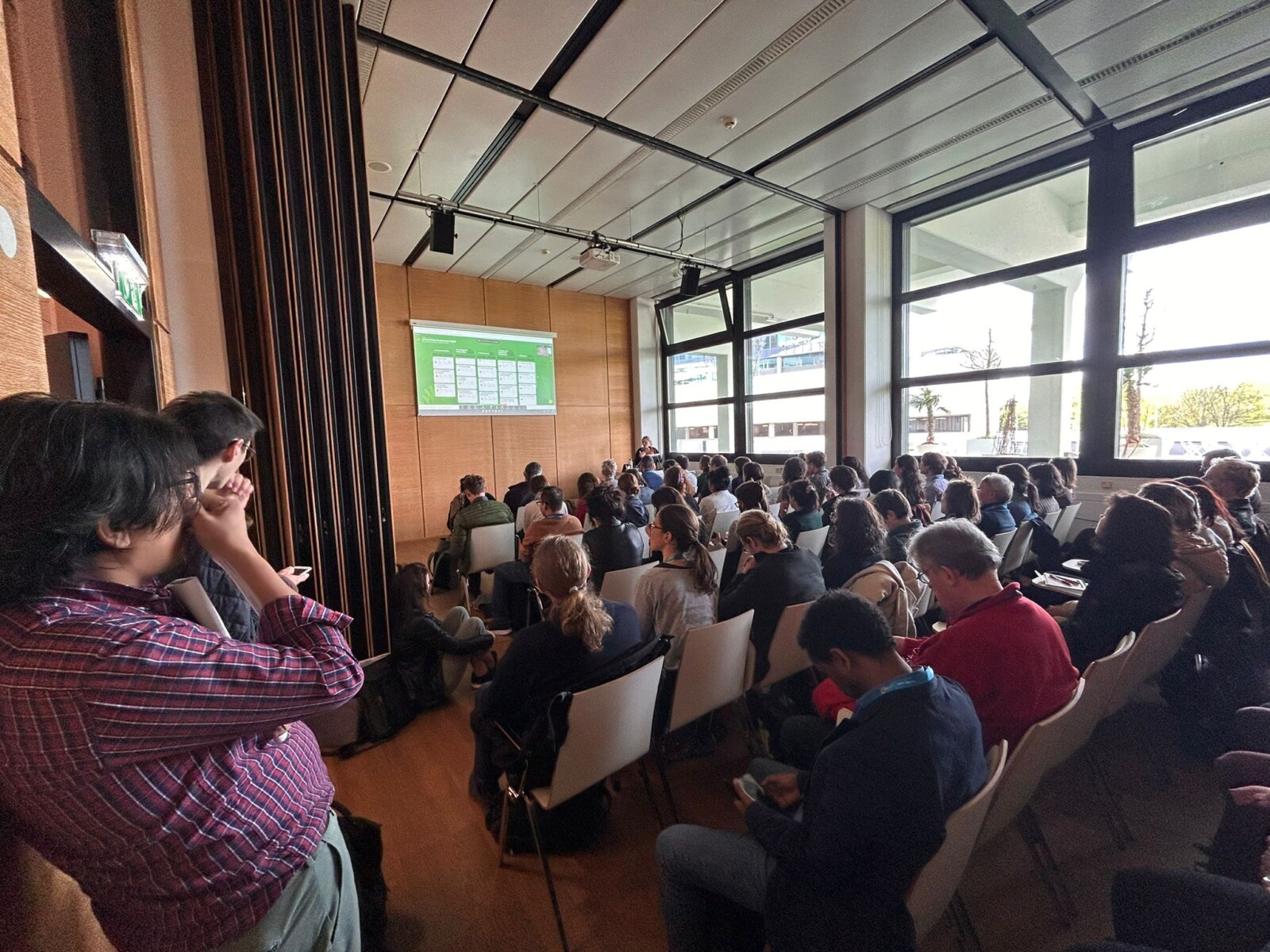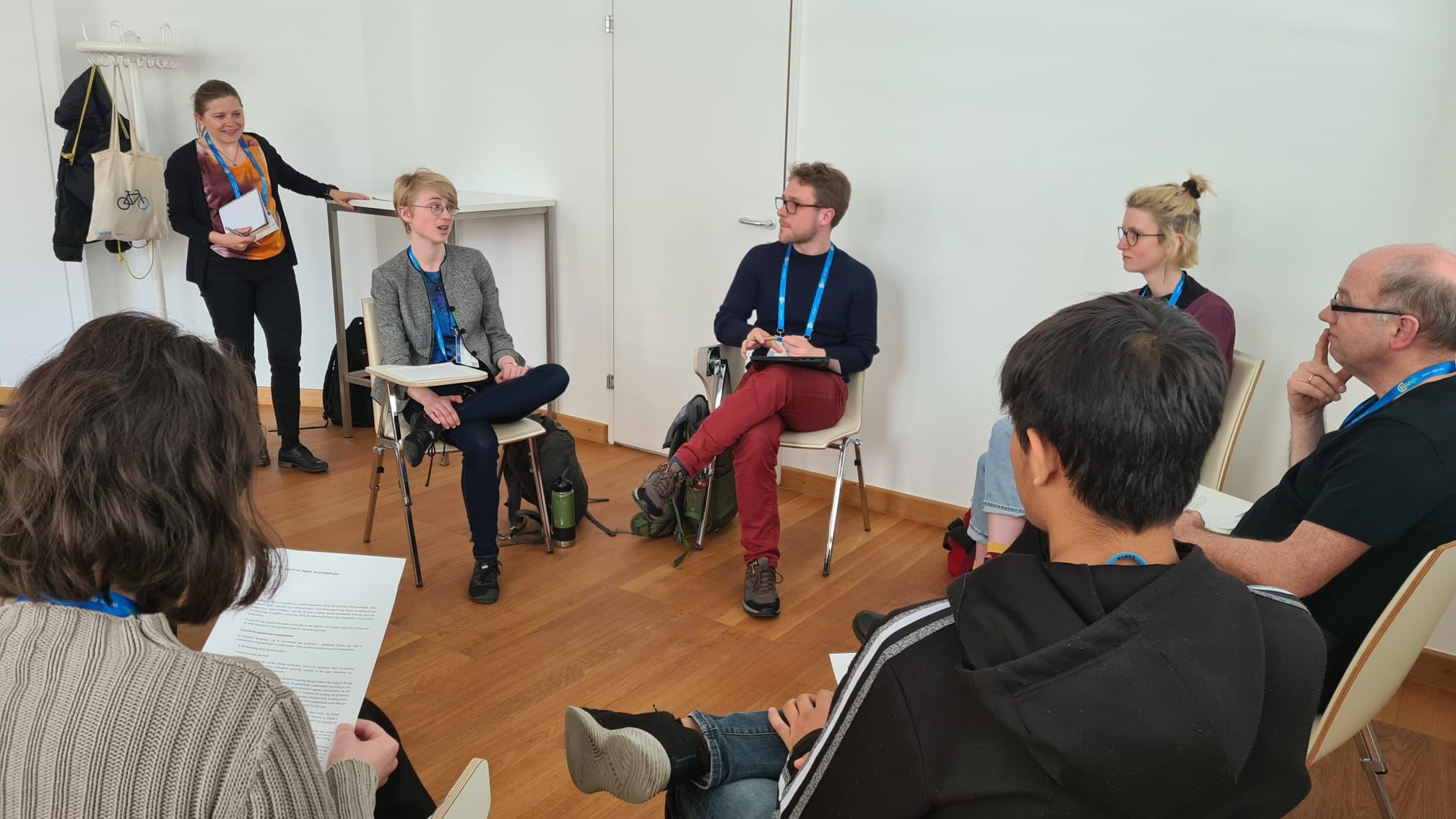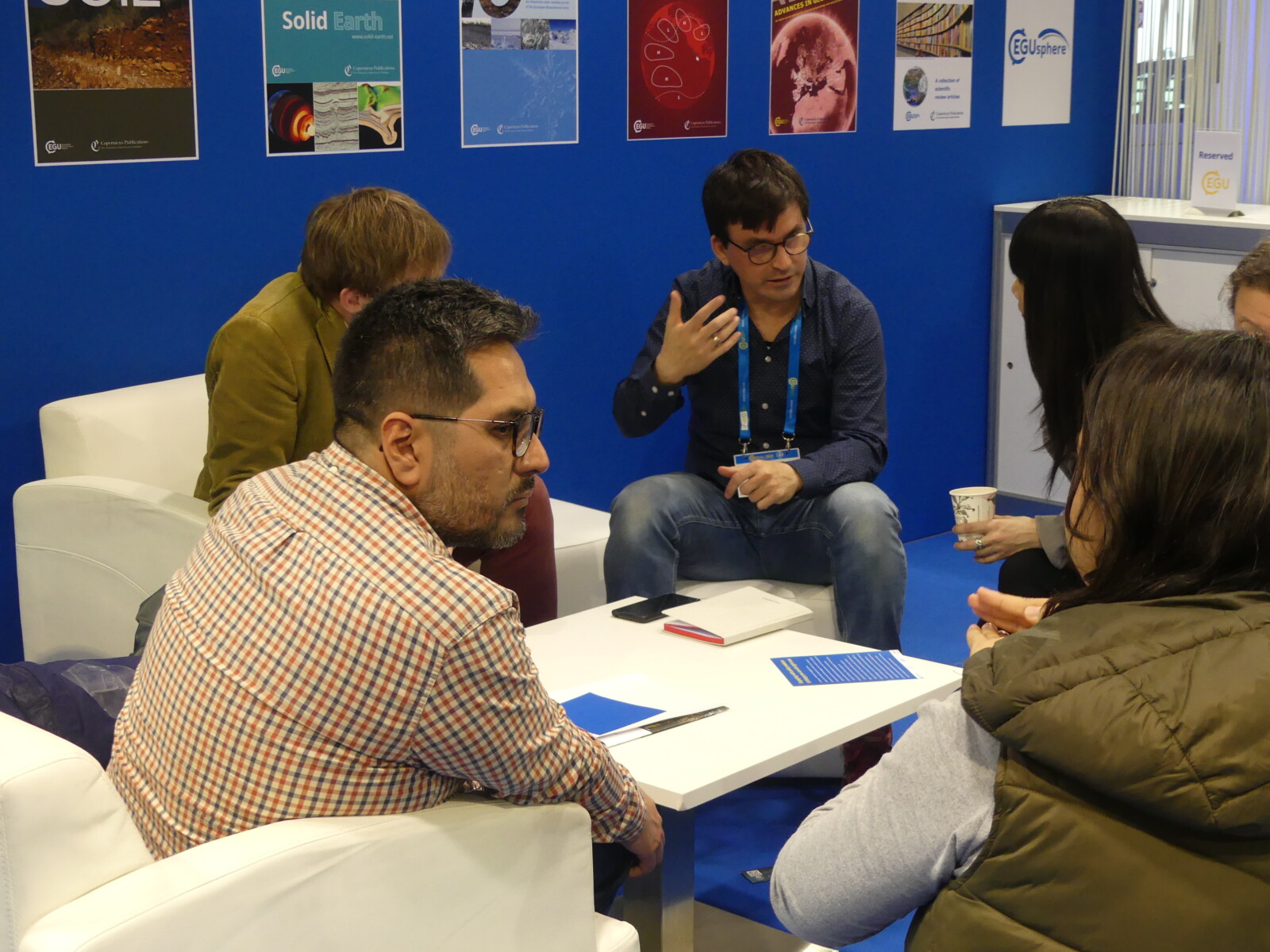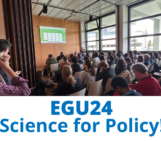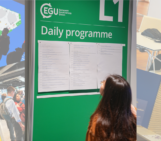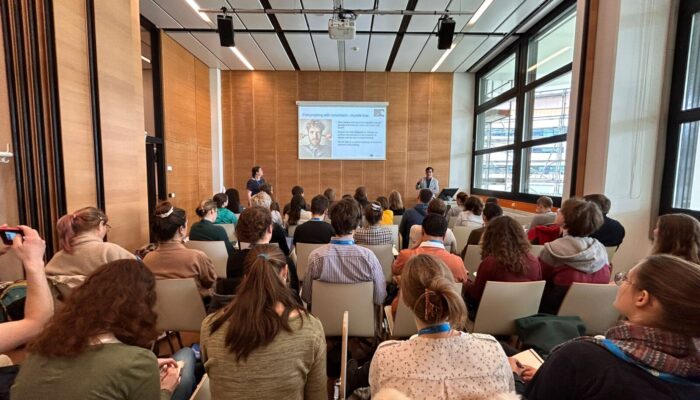
Each year, the EGU’s Science for Policy Programme at the EGU General Assembly provides participants with insights on how their research and expertise can be integrated into the policymaking process and the opportunities that exist for them to engage. This month’s GeoPolicy Blog post highlights some of the exciting #Sci4Pol sessions and initiatives that you can engage with!
While this blog post highlights a number of #Science4Policy related EGU25 sessions, you can find a lot more in this year’s programme using the Science for Policy Tag! If you know of an EGU25 session that provides participants with information about policy processes or how science can be integrated into policymaking that isn’t yet tagged, please let us know via policy@egu.eu.
Union-wide session: Dive into key #Science4Policy Topics
Union Symposia and Great Debates serve as a forum for exploring innovative, timely, and widely relevant topics across geoscience-related areas! Every year, a number of these sessions either touch on or focus on science-for-policy themes.
Bridging Policy and Science for EU Disaster Preparedness
Monday 28 April, 8:30 – 10:15 CEST, Room E1 (Yellow Level)
The EU’s new strategic agenda for 2024-2029 states that it will strengthen its resilience, preparedness, crisis prevention and response capacities in an all-hazards and whole-of-society approach to protect its citizens and societies against different crises, including disasters. This Union Symposium will bring together the scientific and policy community, highlighting the EU’s scientific needs for disaster resilience.
How to translate fundamental research into societal and policy impact
Wednesday 30 April, 10:45–12:30 CEST, Room E1 (Yellow Level)
How can individual researchers contribute effectively in societal and policy actions? Which mechanisms should be created to facilitate the harnessing of research results? What is the role of Scientific Advisory Boards? And where is research budget best invested? Join this Great Debate to hear expert panellists discuss these questions and more!
Science and Activism – Compatible or Antithetical?
Thursday 1 May, 16:15–18:00 CEST, Room E1 (Yellow Level)
Many of the challenges of today raise difficult questions about what the role of scientists should play! There is tension between the need for scientific objectivity and the need to highlight and push for greater action on issues that we know exist. This Great Debate will consider the roles researchers can play and whether it’s possible to do both without compromising our scientific integrity.
Short Courses: Building practical skills for policy engagement
Short Courses provide General Assembly participants with practical tools and skills that can help them in various aspects of their research career. Short Courses focus on a huge range of different topics (from ethics to AI). This year there are a number of Short Course that will give attendees information and opportunities to develop essential skills for effective science-policy engagement!
Your guide to science diplomacy
Monday 28 April, 14:00–15:45 CEST, Room -2.82 (Purple Level)
During this Short Course, experts will introduce key science diplomacy concepts and outline the skills that are required to effectively engage in science diplomacy. They will also provide practical insights on how researchers can actively participate in science diplomacy, explore real-life examples of science diplomacy, and highlight resources where participants can learn more about science diplomacy moving forward.
Academic activism for urgent climate action: How to get started?
Monday 28 April, 19:00–20:00 CEST, Room -2.82 (Purple Level)
Scientists have now been sounding the alarm about the climate and ecological crisis for decades. However, these warnings have been met with insufficient responses, political inertia, or worse active denial or institutionalised efforts to delay action. Join this Short Course to gain first-hand experience and practical tools to organise on climate actions within or outside of your institution!
Climate change, morals and how people understand the politics of climate change
Tuesday 29 Apr, 14:00–15:45 CEST, Room -2.62 (Purple Level)
How can scientists and governments ensure that their communication resonates more deeply with citizens without resorting to the manipulative tactics used by those who seek to undermine liberal democracy? How can scientific and government actors ensure their communications are equally meaningful and ethical? Join this Short Course to find out!
Science for Policy 101
Tuesday 29 April, 16:15–18:00 CEST, Room -2.82 (Purple Level)
Start your #Science4Policy journey by diving into this Short Course on the basics of policy and how to engage with it. Relevant to all career stages, the information provided will also help you understand the different paths available depending on the level of engagement you are interested in.
Splinter Meetings: Engage in Meaningful Discussions
Splinter meetings are held in a more intimate setting, accommodating up to 30 participants. These in-person sessions often take the form of roundtable discussions, providing everyone with the chance to actively contribute and engage in meaningful conversations.
Shaping your Science-Policy career: Pathways and opportunities
Monday 28 April, 16:15–18:00 CEST, Room 2.97 (Red Level)
What does a career in between science and policy look like? What types of positions exist and what skills do professionals who work on the science-policy interface need? Join this Splinter Meeting to meet those working across the science-policy spectrum and hear their tips about how you can take the next step in your own career!
Pitch your research to a policymaker
Tuesday 29 April, 10:45–12:30 CEST, Room 2.96 (Red Level)
This session invites participants to give short (5 minute) presentations of their research to a panel of policymakers and those working on the science-policy interface! This will not only allow those involved and those in the audience to gain a better understanding of how to effectively present to policymakers but also highlight specific aspects of the presentation that are likely to resonate with the policy community moving forward!
EGU25 Science-Policy splinter meeting
Tuesday 29 April, 14:00–15:45 CEST, Room 2.42 (Red Level)
Join this networking session to share ideas, connect with others working on the science-policy interface and discuss how research can support policymaking. Conversation starters and snacks will be provided!
Have your say on policymaking: How to answer a call for evidence
Wednesday 30 April, 14:00–15:45 CEST, Room 2.97 (Red Level)
When proposing a new legislation or updating policies, governments require input from citizens and the scientific community. Led by policy experts, this Splinter Meeting will provide participants with all the information that they need to submit evidence through these government established mechanisms! It will also provide you with tips about how to frame your evidence so that it is used by policymakers.
Meet your EGU Division Policy Officer & EGU Points of Policy Contact
Thursday 1 May, 14:00–15:45 CEST, Room 2.97 (Red Level)
EGU Division Policy Officers and Points of Policy Contact can help you to understand the European policy landscape and how to engage with policymaking processes! Join us at this splinter meeting to meet others within your EGU Division who are interested in Science for Policy and the opportunities that exist for you to get involved. We’d also love to hear your experiences and ideas!
How to write a policy brief
Thursday 1 May, 16:15–18:00 CEST, Room 2.97 (Red Level)
Policy briefs are concise, accessible documents that aim to communicate the practical implications of research to a particular policy audience and provide them with solutions to a specific issue. During this Splinter, participants will be provided with tips and tools to create their own policy brief as well as interactive exercises to work on with other attendees and the session’s leaders.
Scientific Sessions: Exploring Thematic Connections
Each year, there are also scientific sessions in the programme that are dedicated to fostering connections between science and policy within specific research areas. These sessions are spread across various EGU divisions meaning that you can attend policy-relevant topics that are related to your discipline. A selection of these sessions is highlighted below, with additional options available in the policy section of the program!
Atmospheric Science for action: Linking air quality, climate, health, equity, and policy
Monday 28 April, 10:45–12:30 CEST (Orals), 16:15–18:00 CEST (Posters)
Air quality and climate hazards induce risks to exposed populations that impact public health, equity, and resilience often through compounding exposures that motivates policy action. Some of the abstracts in this session will dive into how research on air quality, climate, health, and equity has informed and influenced legislation.
Towards net zero and beyond: remaining carbon budgets, negative emissions, mitigation pathways and implications for policy
Tuesday 29 April, 08:30–12:30 CEST (Orals), 16:15–18:00 CEST (Poster)
This session aims to further our understanding of the science surrounding the achievement of net-zero emissions and the Paris Agreement mitigation goal with particular interest in remaining carbon budgets, emission pathways entailing net-zero targets, carbon dioxide removal strategies, the theoretical underpinnings of these concepts, and their policy implications.
Water resources policy and management – balancing the water, food, energy and environment nexus for resilient water systems under global change
Wednesday 30 April, 14:00 – 15:40 CEST (Orals), Thursday 1 May, 10:45-15:40 CEST (Posters)
Integrative approaches to water management and policy are required to balance and manage trade-offs between social, economic, and environmental uses of water. This session will showcase novel research at the intersection of agricultural production, energy security, water supply, economic development, and environmental conservation. Abstracts include real-world examples on the successful application of these methods to facilitate integrated planning and management of the water-food-energy-environment nexus.
Strengthening Policy Through Science: Insights from the Interface
Friday 2 May, 8:30–10:15 & 14:00 – 15:45 CEST (Orals), Friday 2 May, 10:45 – 12:30 CEST (Poster)
This session aims to show how research activities and outputs may impact society and policy beyond the academic world. It will highlight stories of success and failure from scientists who have engaged in policy or other activities that made critical societal impacts – either on an international, European, national, or local level – across different geoscience disciplines.
EGU Science for Policy Help Desk
Have questions about science for policy? Stop by the EGU Science for Policy Help Desk at the EGU Booth from 12:00-13:00 daily during EGU25 for personalised guidance and to discuss effective ways to share your expertise!
Free registrations for European Policymakers
This is also the first year that EGU is offering a free registration to (either on-site or virtual) to European policymakers. While it’s probably too late to invite policymakers to participate in your sessions this year, you might know of some who would like to listen in on sessions relating to their work! Please feel free to send this form to any policymakers you know who may be interested in attending.The EGU General Assembly is always a busy week with plenty to do! If you’re passionate about policy and eager to share your knowledge, be sure to include policy-focused sessions in your EGU25 schedule. Looking forward to seeing you there!

